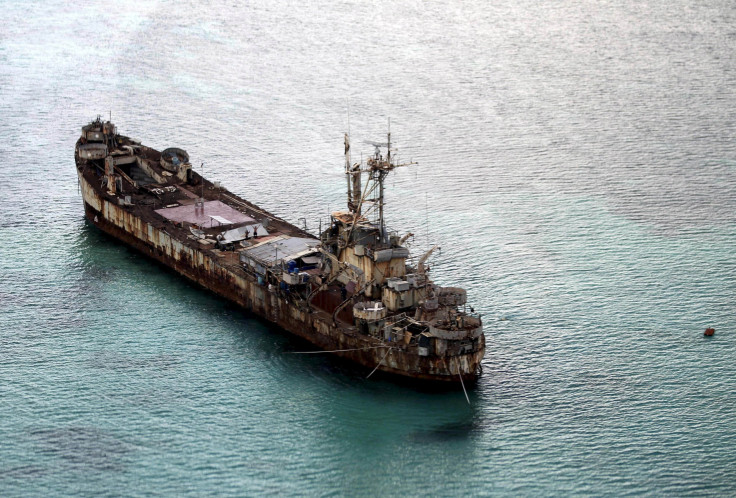Philippines May Be 'Dwarfed' In A Military Showdown With China Over Territorial Spat, Experts Say

KEY POINTS
- Tensions have been high recently after the Chinese Coast Guard used a water cannon on Philippine vessels
- Aggression plus demands could mean Beijing is nearing an "ultimatum": Hudson Institute's Patrick Cronin
- Tensions may escalate significantly if China seizes the grounded ship: Soka University's Shane Barter
Beijing took its dispute with the Philippines over the West Philippine Sea a notch higher when it sprayed Philippine vessels using a water cannon. Though unlikely, should China launch an armed offensive with the Philippines' current military capacity, there is "no way" the latter will win, experts said.
The Asian countries' territorial dispute heated up in the past weekend after a Chinese Coast Guard (CCG) ship used a water cannon to spray on vessels being escorted by the Philippine Coast Guard (PCG) at the Second Thomas Shoal, which the Philippines calls Ayungin Shoal and China refers to as Ren'ai Reef.
In response to China's hostility, Philippine President Ferdinand Marcos Jr. said Manila summoned Beijing's envoy Monday over the latest standoff, as it did in February when a CCG ship directed a "military-grade laser" at a PCG vessel during a resupply mission.
The Southeast Asian nation doesn't have much of an option at this point besides standing its ground and communicating, Shane Barter, a professor of comparative politics and former director of the Pacific Basin Research Center at Soka University of America, told International Business Times. Though he feels bad about his less than optimistic views, he noted, "China's power is the reality in the region."
Louie Benedict Ignacio, chair of the political science department at the University of Santo Tomas, told IBT summoning the Chinese ambassador won't do much in preventing Beijing's aggression, even with the Philippines' having "legal leverage" due to its 2016 international arbitral victory that Beijing has repeatedly refused to recognize.
On Tuesday, the Chinese foreign ministry's spokesperson said in a statement the CCG's latest actions were in response to Manila's alleged continuous refusal to remove a grounded ship at the disputed area. The ministry said the Philippines ignored Beijing's request to stop sending construction materials to the grounded vessel for "repairing and reinforcing" purposes.
"China Coast Guard responded in accordance with the law to safeguard China's sovereignty and maritime rights and interests," the spokesperson said.
The ship in question, the BRP Sierra Madre, was deliberately grounded in the late 1990s to emphasize Philippine territorial claims in the area.
Marcos Jr. said Wednesday he was "not aware of any agreement that the Philippines should remove from its own territory its own ship." If an "agreement" regarding the said removal of the vessel does exist, he said he rescinds the said deal.
Watch President Marcos' statement here. 🎥 @pcogovph pic.twitter.com/VYZ0JXUj7Y
— Nestor A. Corrales (@NCorralesINQ) August 9, 2023
China's move of combining aggression and active demands shows a "hardening" stance.
"Beijing appears to be inching closer to an ultimatum," Patrick M. Cronin, chair for Asia-Pacific security at the Hudson Institute, told IBT.
On the other hand, the experts doubt an actual Chinese military attack is likely, even after Philippine National Security Council assistant director general Jonathan Malaya said the Philippines "will never abandon Ayungin Shoal."
However, if an armed attack does occur, the Philippines just doesn't stand a chance to thwart Beijing's military prowess, Ignacio said, adding, "Our military power will be dwarfed by the giant arsenal of China."
Barter said tensions may only escalate considerably if China seizes the grounded vessel or detains the PCG crew.
Washington and other allies such as the EU and Japan have decried China's latest aggressive actions in the West Philippine Sea. However, the question remains on whether they will actually get involved if Beijing launches an armed offensive.
Some analysts suggested that the current situation has huge potential to draw a "superpower conflict" based on the US-PH Mutual Defense Treaty, after the U.S. reaffirmed Saturday that an armed attack on the Philippines would invoke the treaty. Ignacio pointed out that even if the long-standing defense agreement exists, it was "vague" in provisions regarding when or what specific actions will prompt Washington to defend its long-time ally.
Also, sparking a stronger anti-China coalition may result in "bigger potential cost" for involved parties, considering how blocking Beijing's maritime expansions remains problematic even among other Southeast Asian nations, Cronin pointed out. China had warned in April that "third party" intervention in its dispute with the Philippines would turn the disputed waters "into the sea of war."
Setting aside the idea of a military-centric response, the Philippines can instead find ways to put more pressure on the Asian superpower regardless of international support, Ignacio said. In particular, Manila can pressure China economically, or "completely close its market" to possibly trigger a ripple effect that could get other Asian countries on board in pressuring Beijing, he said. The Philippines isn't China's largest trading partner, but Chinese exports to the country are still significant, with the annual exports reaching $48.9 billion in 2021.
© Copyright IBTimes 2025. All rights reserved.






















